Submitted:
10 May 2024
Posted:
10 May 2024
You are already at the latest version
Abstract
Keywords:
1. Introduction
2. Materials and Methods
2.1. Experiment Site and Preparation
2.2. Data Collection and Analysis
2.2.1. Rainfall
2.2.2. Runoff and Soil Loss
2.2.3. Antecedent Soil Moisture Content
3. Results and Discussion
5. Conclusions
- Duration of the effective erosion event outranks the antecedent volumetric soil moisture content. Contribution of antecedent soil moisture content only affects the progress of erosion in the early stages of the rain event.
- The accumulative rainfall (Pp) prior to an effective erosion event elevates the antecedent soil moisture content, that in turns affect the erosion process. Field study on clay soil suggests that accumulative rain falling within 48 hours (Pp48) prior to an effective erosion event strongly correlated with soil loss per Rainfall-Runoff Erosivity Index (Soil Loss / EI30) that also termed as soil erodibility. When the duration of an effective erosion event is either between 3 ~ 7 hours or 10~ 30 hours, Pp48 plays noticeable contribution to (Soil Loss / EI30). However, Pp48 does not affect (Soil Loss / EI30) for 0 ~ 3-h duration event when Pp48 is less than 20 mm. Hence, Pp48 can be considered as an alternative to replace antecedent soil moisture content in RUSLE 2’s cover and management factor.
- The effect of antecedent volumetric soil moisture contents to (Soil loss / EI30) exists in rain events of lower rainfall duration, less rainfall amount, and low Rainfall-Runoff Erosivity Index. The characteristics of these events include average rainfall duration of 6.23 hours, average rainfall amount of 15.5 mm, average EI30 of 78.7 MJ- mm/ha-h, average time interval to preceding rain event within about 40.5 hours, and the average rain intensity about 8.3 mm/h. These events fall in the lower boundary of heavy rain category (average intensity between 7.6 and 50 mm/h).
Author Contributions
Acknowledgments
References
- Bennett, H.H. Soil Conservation.; McGraw-Hill Book Company; First Edition, 1939.
- Kirkby, M.J., Morgan, R.P.C., Eds.; Soil Erosion; Wiley: Chichester Eng.; New York, 1980; ISBN 978-0-471-27802-3.
- Wang, Y.; Liu, G.; Zhao, Z.; Wu, C.; Yu, B. Using Soil Erosion to Locate Nonpoint Source Pollution Risks in Coastal Zones: A Case Study in the Yellow River Delta, China. Environ. Pollut. 2021, 283. [CrossRef]
- Borah, D.K.; Bera, M. Watershed-Scale Hydrologic and Nonpoint-Source Pollution Models: Review of Mathematical Bases. Trans. Am. Soc. Agric. Eng. 2003, 46, 1553–1566.
- An, J.; Zheng, F.L.; Han, Y. Effects of Rainstorm Patterns on Runoff and Sediment Yield Processes. Soil Sci. 2014, 179, 293–303. [CrossRef]
- Wischmeier, W.H.; Smith, D.D. Predicting Rainfall Erosion Losses: A Guide to Conservation Planning; Department of Agriculture, Science and Education Administration, 1978.
- Alewell, C.; Borrelli, P.; Meusburger, K.; Panagos, P. Using the USLE: Chances, Challenges and Limitations of Soil Erosion Modelling. Int. Soil Water Conserv. Res. 2019, 7, 203–225. [CrossRef]
- Renard, K.G., Foster, G.R., Weesies, G.A., McCool, D.K., Yoder, D.C., (Eds.) Predicting Soil Erosion by Water: A Guide to Conservation Planning with the Revised Universal Soil Loss Equation (RUSLE); Agricultural handbook; USDA, Agricultural Research Service: Washington, DC, 1997; ISBN 978-0-16-048938-9.
- Knisel, W.G. CREAMS: A Field Scale Model for Chemicals, Runoff, and Erosion from Agricultural Management Systems; Conservation research report; Dept. of Agriculture, Science and Education Administration: Washington, 1980.
- Young, R.; Onstad, C.; Bosch, D.; Anderson, W. AGNPS: A Non-Point-Source Pollution Model for Evaluating Agricultural Watersheds. Journal of Soil and Water Conservation 1989, 44.
- Laflen, J.M.; Elliot, W.J.; Flanagan, D.C.; Meyer, C.R.; Nearing, M.A. WEPP-Predicting Water Erosion Using a Process-Based Model. J. Soil Water Conserv. 1997, 52, 96–102.
- Flanagan, D.; Gilley, J.; Franti, T. Water Erosion Prediction Project (WEPP): Development History, Model Capabilities, and Future Enhancements. Transactions of the ASABE 2007, 50, 1603–1612. [CrossRef]
- Arnold, J.G.; Fohrer, N. SWAT2000: Current Capabilities and Research Opportunities in Applied Watershed Modelling. Hydrol. Processes 2005, 19, 563–572. [CrossRef]
- Wischmeier, W.H.; Johnson, C.B.; Cross, B. SOIL ERODIBILITY NOMOGRAPH FOR FARMLAND AND CONSTRUCTION SITES. Journal of Soil and Water Conservation 1971.
- Knapen, A.; Poesen, J.; Govers, G.; Gyssels, G.; Nachtergaele, J. Resistance of Soils to Concentrated Flow Erosion: A Review. Earth Sci. Rev. 2007, 80, 75–109. [CrossRef]
- Kemper, W.D.; Rosenau, R.C. Soil Cohesion as Affected by Time and Water Content. Soil Science Society of America Journal 1984, 48, 1001–1006. [CrossRef]
- Shainberg, I.; Goldstein, D.; Levy, G.J. Rill Erosion Dependence on Soil Water Content, Aging, and Temperature. Soil Sci. Soc. Am. J. 1996, 60, 916–922. [CrossRef]
- Le Bissonnais, Y.; Bruand, A.; Jamagne, M. Laboratory Experimental Study of Soil Crusting: Relation between Aggregate Breakdown Mechanisms and Crust Structure. CATENA 1989, 16, 377–392. [CrossRef]
- Holz, D.J.; Williard, K.W.J.; Edwards, P.J.; Schoonover, J.E. Soil Erosion in Humid Regions: A Review. Journal of Contemporary Water Research & Education 2015, 154, 48–59. [CrossRef]
- Wei, L.; Zhang, B.; Wang, M. Effects of Antecedent Soil Moisture on Runoff and Soil Erosion in Alley Cropping Systems. Agricultural Water Management 2007, 94, 54–62. [CrossRef]
- Auerswald, K.; Mutchler, C.K.; McGregor, K.C. The Influence of Tillage-Induced Differences in Surface Moisture Content on Soil Erosion. Soil Tillage Res. 1994, 32, 41–50. [CrossRef]
- Fortesa, J.; Latron, J.; García-Comendador, J.; Company, J.; Estrany, J. Runoff and Soil Moisture as Driving Factors in Suspended Sediment Transport of a Small Mid-Mountain Mediterranean Catchment. Geomorphology 2020, 368, 107349. [CrossRef]
- Massari, C.; Pellet, V.; Tramblay, Y.; Crow, W.T.; Gründemann, G.J.; Hascoetf, T.; Penna, D.; Modanesi, S.; Brocca, L.; Camici, S.; et al. On the Relation between Antecedent Basin Conditions and Runoff Coefficient for European Floods. Journal of Hydrology 2023, 625, 130012. [CrossRef]
- Jadidoleslam, N.; Hornbuckle, B.; Krajewski, W.; Mantilla, R.; Cosh, M. Analyzing Effects of Crops on SMAP Satellite-Based Soil Moisture Using a Rainfall-Runoff Model in the U.S. Corn Belt. IEEE Journal of Selected Topics in Applied Earth Observations and Remote Sensing 2021, PP, 1–1. [CrossRef]
- Schoener, G.; Stone, M.C.; Thomas, C. Comparison of Seven Simple Loss Models for Runoff Prediction at the Plot, Hillslope and Catchment Scale in the Semiarid Southwestern U.S. Journal of Hydrology 2021, 598, 126490. [CrossRef]
- Luk, S.-H.; Hamilton, H. Experimental Effects of Antecedent Moisture and Soil Strength on Rainwash Erosion of Two Luvisols, Ontario. Geoderma 1986, 37, 29–43. [CrossRef]
- Wang, L.; Zheng, F.; Hu, W.; Zhang, X.J.; Shi, H. Interactive Effects of Rainfall Intensity, Kinetic Energy and Antecedent Soil Moisture Regime on Splash Erosion in the Ultisol Region of South China. CATENA 2023, 222, 106863. [CrossRef]
- Castillo, V.; Gomezplaza, A.; Martinezmena, M. The Role of Antecedent Soil Water Content in the Runoff Response of Semiarid Catchments: A Simulation Approach. Journal of Hydrology 2003, 284, 114–130. [CrossRef]
- Truman, C.C.; Bradford, J.M.; Ferris, J.E. Antecedent Water Content and Rainfall Energy Influence on Soil Aggregate Breakdown. Soil Science Society of America Journal 1990, 54, 1385–1392. [CrossRef]
- Armenise, E.; Simmons, R.W.; Ahn, S.; Garbout, A.; Doerr, S.H.; Mooney, S.J.; Sturrock, C.J.; Ritz, K. Soil Seal Development under Simulated Rainfall: Structural, Physical and Hydrological Dynamics. J. Hydrol. 2018, 556, 211–219. [CrossRef]
- Auerswald, K. Influence of Initial Moisture and Time since Tillage on Surface Structure Breakdown and Erosion of a Loessial Soil. CATENA Supplement 1993, 24, 93–101.
- Ma, R.-M.; Li, Z.-X.; Cai, C.-F.; Wang, J.-G. The Dynamic Response of Splash Erosion to Aggregate Mechanical Breakdown through Rainfall Simulation Events in Ultisols (Subtropical China). CATENA 2014, 121, 279–287. [CrossRef]
- Organization, W.M. Guide to Meteorological Instruments and Methods of Observation; Secretariat of the World Meteorological Organization, 2018; ISBN 978-92-63-16008-9.
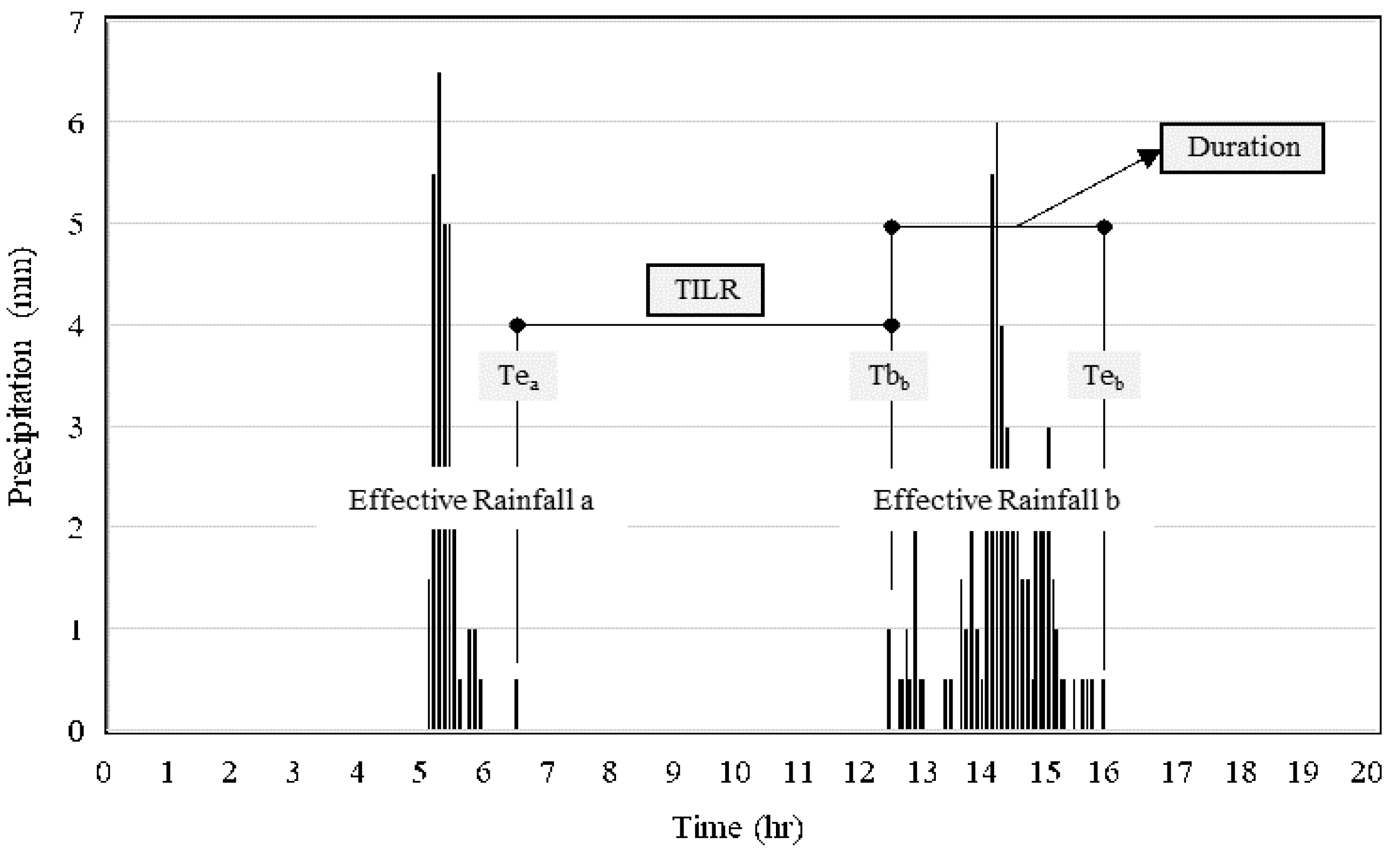
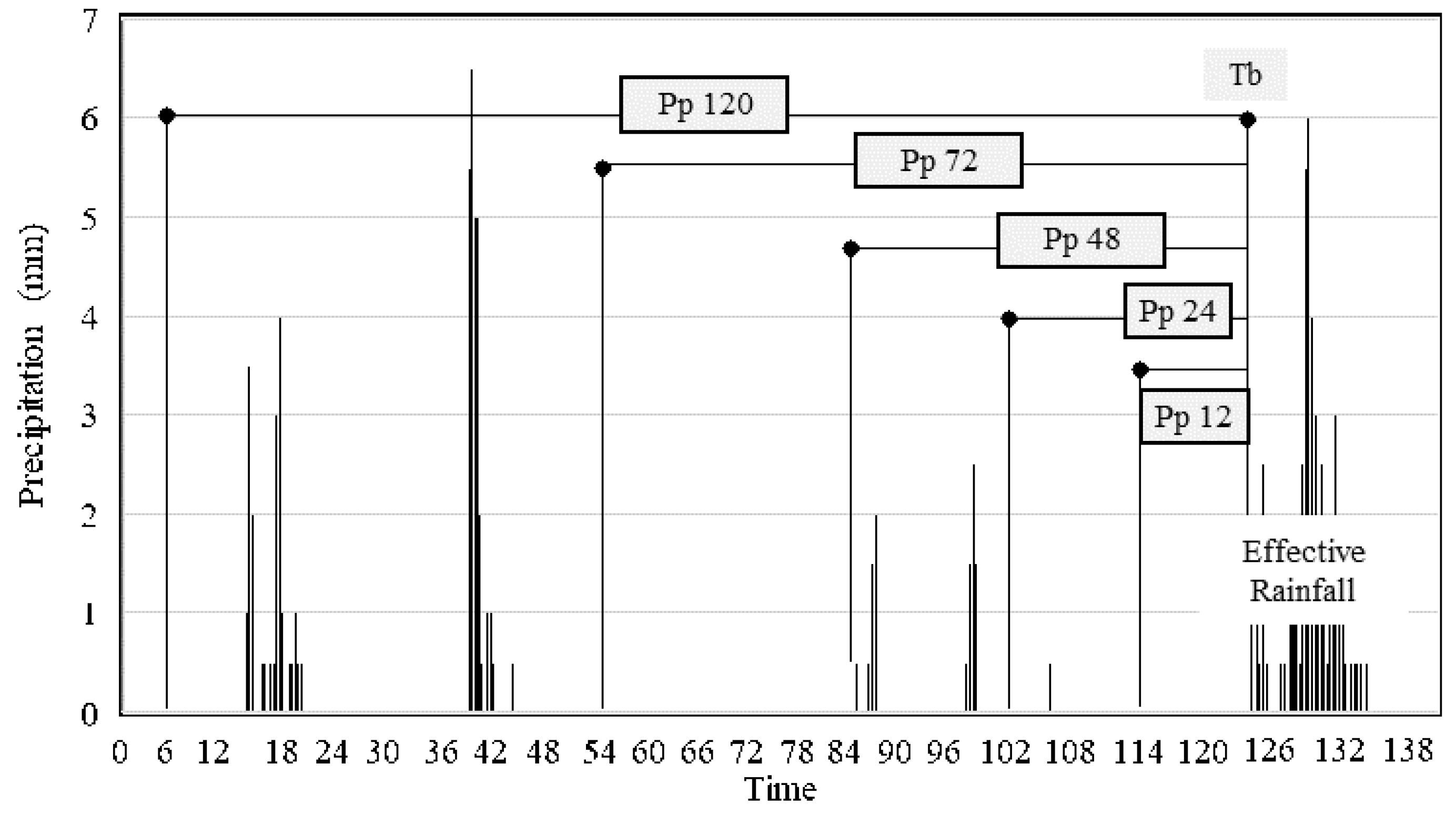
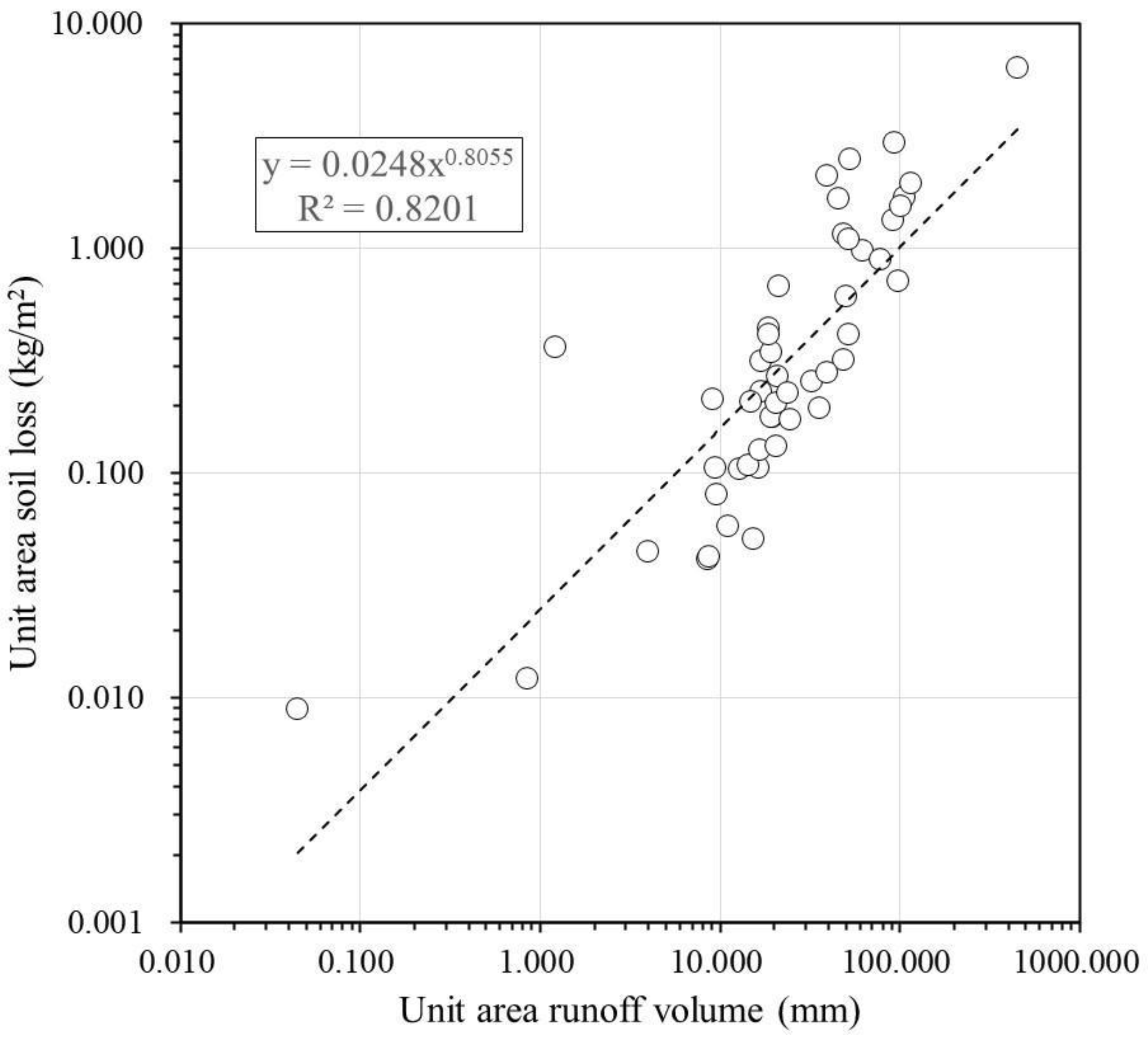
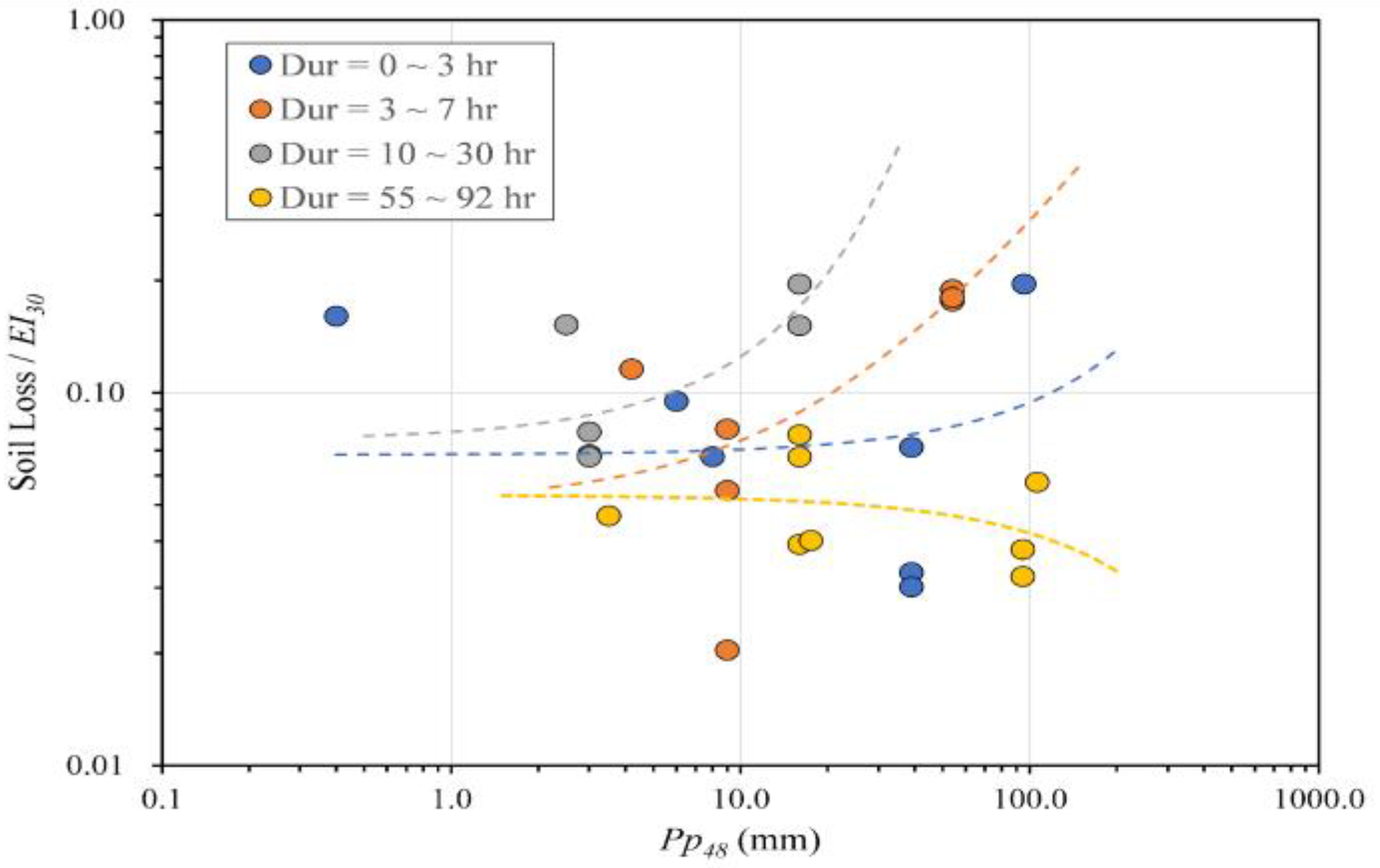
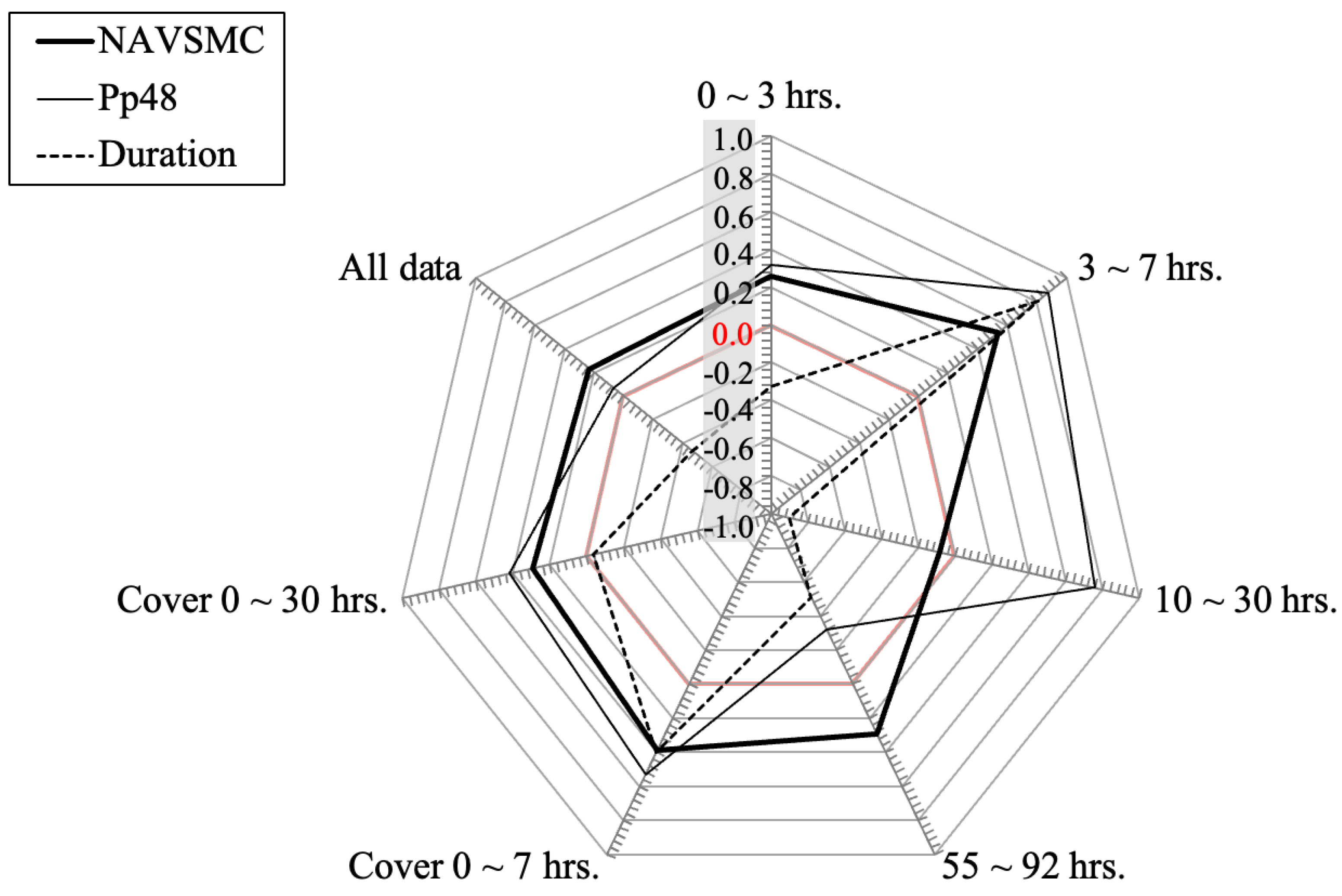

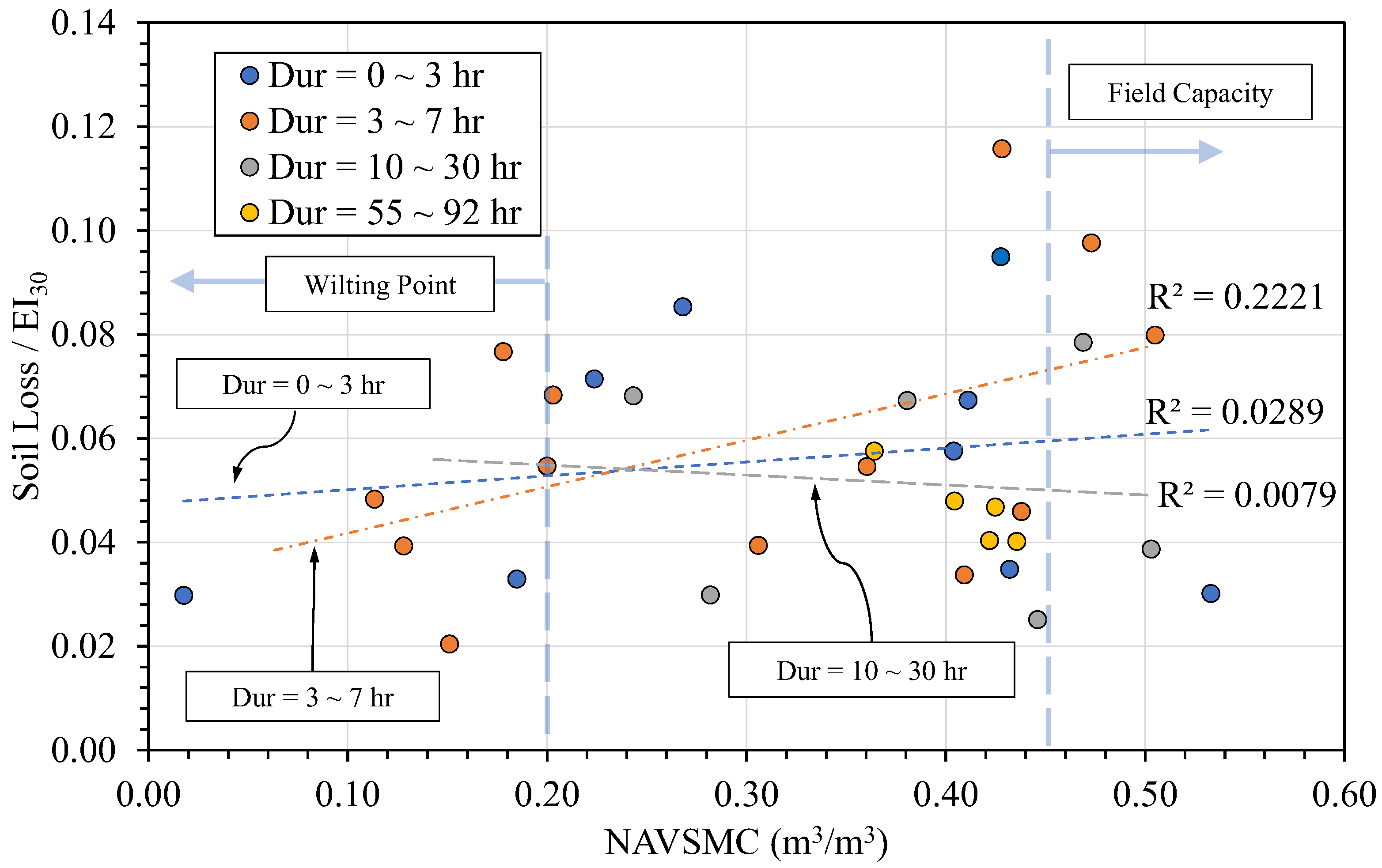
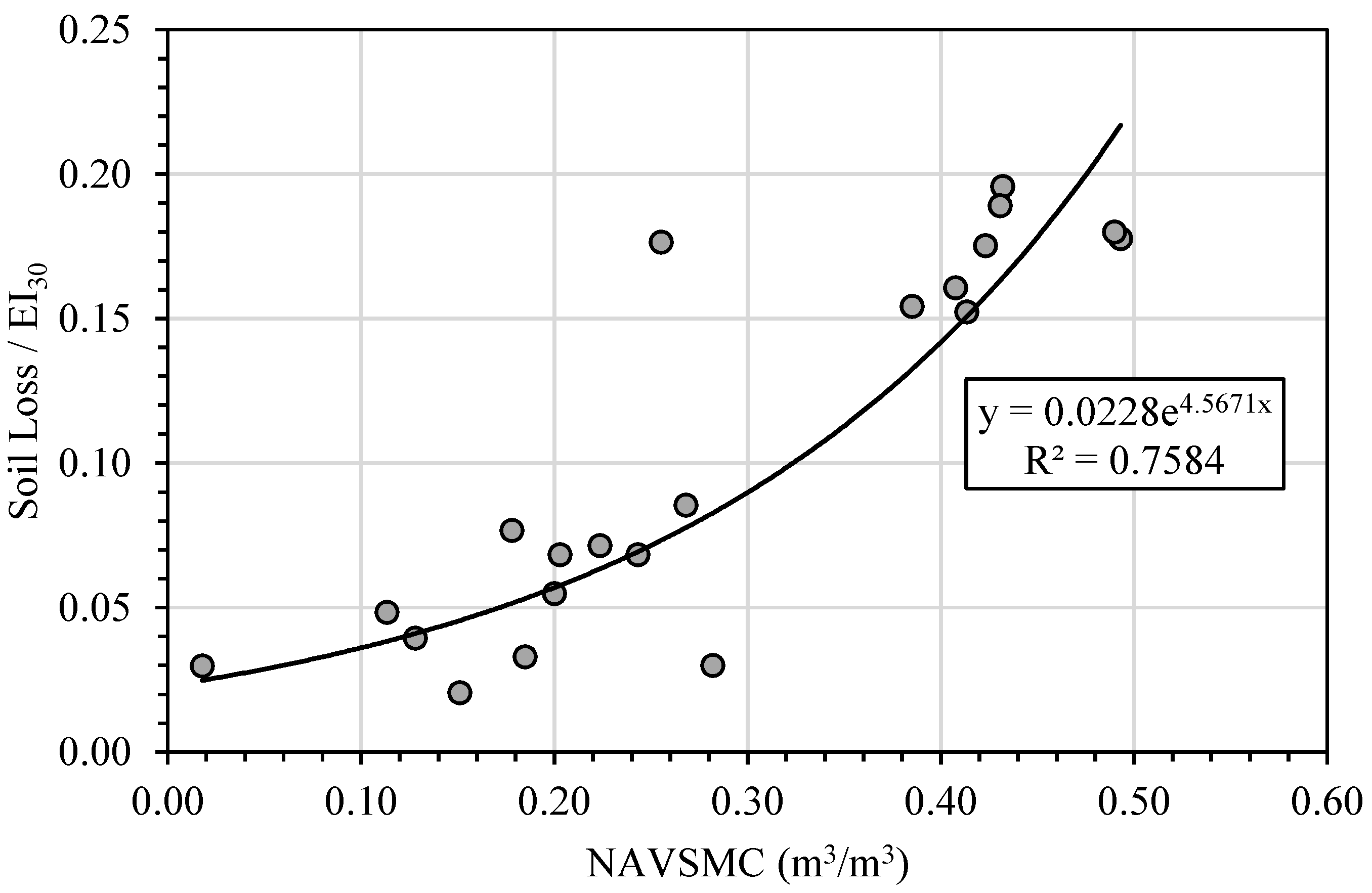
| Event No. | Unit area soil loss | Unit area runoff volume |
Precp. | EI30 | Soil loss / EI30 | C | NAVSMC | Pp12 | Pp24 | Pp48 | Pp72 | Pp120 | Event Duration | TILR |
|---|---|---|---|---|---|---|---|---|---|---|---|---|---|---|
| kg/m2 | mm | mm | MJ-mm / ha-h |
(kg/m2) / (MJ-mm/ ha-h) |
- | m3/m3 | mm | mm | mm | mm | mm | h | h | |
| 1 | 0.080 | 9.60 | 34.0 | 391.75 | 0.020 | 0.28 | 0.15 | 0.0 | 9.0 | 9.0 | 9.0 | 9.5 | 3.17 | 213.00 |
| 2 | 0.214 | 9.20 | 34.0 | 391.75 | 0.055 | 0.27 | 0.20 | 0.0 | 9.0 | 9.0 | 9.0 | 9.5 | 3.17 | 213.00 |
| 3 | 0.313 | 17.02 | 34.0 | 391.75 | 0.080 | 0.50 | 0.51 | 0.0 | 9.0 | 9.0 | 9.0 | 9.5 | 3.17 | 213.00 |
| 4 | 0.177 | 19.58 | 39.0 | 451.04 | 0.039 | 0.50 | 0.13 | 0.0 | 0.0 | 0.0 | 34.0 | 43.0 | 3.33 | 68.83 |
| 5 | 0.346 | 19.43 | 39.0 | 451.04 | 0.077 | 0.50 | 0.18 | 0.0 | 0.0 | 0.0 | 34.0 | 43.0 | 3.33 | 68.83 |
| 6 | 0.440 | 18.72 | 39.0 | 451.04 | 0.098 | 0.48 | 0.47 | 0.0 | 0.0 | 0.0 | 34.0 | 43.0 | 3.33 | 68.83 |
| 7 | 0.972 | 61.85 | 87.5 | 2951.65 | 0.033 | 0.71 | 0.18 | 0.0 | 39.0 | 39.0 | 39.0 | 82.0 | 2.42 | 20.25 |
| 8 | 2.109 | 39.19 | 87.5 | 2951.65 | 0.071 | 0.45 | 0.22 | 0.0 | 39.0 | 39.0 | 39.0 | 82.0 | 2.42 | 20.25 |
| 9 | 0.890 | 77.77 | 87.5 | 2951.65 | 0.030 | 0.89 | 0.53 | 0.0 | 39.0 | 39.0 | 39.0 | 82.0 | 2.42 | 20.25 |
| 10 | 0.178 | 19.40 | 23.0 | 117.47 | 0.151 | 0.84 | 0.27 | 0.5 | 3.5 | 16.0 | 21.5 | 114.0 | 10.83 | 104.00 |
| 11 | 0.230 | 16.90 | 23.0 | 117.47 | 0.196 | 0.73 | 0.34 | 0.5 | 3.5 | 16.0 | 21.5 | 114.0 | 10.83 | 104.00 |
| 12 | 1.335 | 91.31 | 117.5 | 1731.80 | 0.077 | 0.78 | 0.28 | 0.5 | 3.5 | 16.0 | 21.5 | 114.0 | 61.33 | 11.08 |
| 13 | 0.679 | 21.39 | 117.5 | 1731.80 | 0.039 | 0.18 | 0.34 | 0.5 | 3.5 | 16.0 | 21.5 | 114.0 | 61.33 | 11.08 |
| 14 | 1.166 | 48.37 | 117.5 | 1731.80 | 0.067 | 0.41 | 0.56 | 0.5 | 3.5 | 16.0 | 21.5 | 114.0 | 61.33 | 11.08 |
| 15 | 2.969 | 93.65 | 402.5 | 7811.82 | 0.038 | 0.23 | 0.29 | 0.5 | 2.0 | 94.5 | 117.5 | 144.0 | 91.50 | 10.50 |
| 16 | 2.511 | 53.17 | 402.5 | 7811.82 | 0.032 | 0.13 | 0.25 | 0.5 | 2.0 | 94.5 | 117.5 | 144.0 | 91.50 | 10.50 |
| 17 | 1.689 | 106.28 | 197.5 | 2476.39 | 0.068 | 0.54 | 0.24 | 0.0 | 0.0 | 3.0 | 3.0 | 25.0 | 28.00 | 133.58 |
| 18 | 1.666 | 45.95 | 197.5 | 2476.39 | 0.067 | 0.23 | 0.38 | 0.0 | 0.0 | 3.0 | 3.0 | 25.0 | 28.00 | 133.58 |
| 19 | 1.944 | 114.89 | 197.5 | 2476.39 | 0.078 | 0.58 | 0.47 | 0.0 | 0.0 | 3.0 | 3.0 | 25.0 | 28.00 | 133.58 |
| 20 | 0.256 | 32.20 | 41.5 | 374.80 | 0.068 | 0.78 | 0.20 | 0.0 | 0.0 | 0.0 | 0.0 | 176.5 | 4.33 | 97.08 |
| 21 | 0.205 | 20.68 | 41.5 | 374.80 | 0.055 | 0.50 | 0.36 | 0.0 | 0.0 | 0.0 | 0.0 | 176.5 | 4.33 | 97.08 |
| 22 | 0.172 | 24.73 | 41.5 | 374.80 | 0.046 | 0.60 | 0.44 | 0.0 | 0.0 | 0.0 | 0.0 | 176.5 | 4.33 | 97.08 |
| 23 | 0.320 | 48.77 | 54.0 | 1070.56 | 0.030 | 0.90 | 0.28 | 0.0 | 0.0 | 0.0 | 0.0 | 0.0 | 13.08 | 121.42 |
| 24 | 0.269 | 21.05 | 54.0 | 1070.56 | 0.025 | 0.39 | 0.45 | 0.0 | 0.0 | 0.0 | 0.0 | 0.0 | 13.08 | 121.42 |
| 25 | 0.414 | 52.16 | 54.0 | 1070.56 | 0.039 | 0.97 | 0.50 | 0.0 | 0.0 | 0.0 | 0.0 | 0.0 | 13.08 | 121.42 |
| 26 | 0.041 | 8.55 | 11.5 | 23.52 | 0.176 | 0.74 | 0.26 | 0.0 | 0.5 | 54.0 | 54.0 | 54.0 | 5.75 | 18.67 |
| 27 | 0.044 | 3.97 | 11.5 | 23.52 | 0.189 | 0.35 | 0.43 | 0.0 | 0.5 | 54.0 | 54.0 | 54.0 | 5.75 | 18.67 |
| 28 | 0.042 | 8.74 | 11.5 | 23.52 | 0.180 | 0.76 | 0.49 | 0.0 | 0.5 | 54.0 | 54.0 | 54.0 | 5.75 | 18.67 |
| 29 | 0.051 | 15.28 | 19.5 | 59.37 | 0.085 | 0.78 | 0.27 | 0.0 | 0.0 | 0.0 | 11.0 | 65.0 | 1.67 | 54.50 |
| 30 | 0.104 | 12.95 | 19.5 | 59.37 | 0.175 | 0.66 | 0.42 | 0.0 | 0.0 | 0.0 | 11.0 | 65.0 | 1.67 | 54.50 |
| 31 | 0.105 | 16.30 | 19.5 | 59.37 | 0.178 | 0.84 | 0.49 | 0.0 | 0.0 | 0.0 | 11.0 | 65.0 | 1.67 | 54.50 |
| 32 | 0.279 | 39.50 | 54.5 | 578.57 | 0.048 | 0.72 | 0.11 | 0.0 | 0.0 | 0.0 | 0.0 | 0.0 | 3.50 | 167.00 |
| 33 | 0.228 | 23.92 | 54.5 | 578.57 | 0.039 | 0.44 | 0.31 | 0.0 | 0.0 | 0.0 | 0.0 | 0.0 | 3.50 | 167.00 |
| 34 | 0.195 | 35.72 | 54.5 | 578.57 | 0.034 | 0.66 | 0.41 | 0.0 | 0.0 | 0.0 | 0.0 | 0.0 | 3.50 | 167.00 |
| 35 | 0.108 | 14.31 | 29.0 | 361.82 | 0.030 | 0.49 | 0.02 | 0.0 | 0.0 | 0.0 | 0.0 | 0.0 | 1.42 | 307.33 |
| 36 | 0.208 | 14.95 | 29.0 | 361.82 | 0.058 | 0.52 | 0.40 | 0.0 | 0.0 | 0.0 | 0.0 | 0.0 | 1.42 | 307.33 |
| 37 | 0.126 | 16.78 | 29.0 | 361.82 | 0.035 | 0.58 | 0.43 | 0.0 | 0.0 | 0.0 | 0.0 | 0.0 | 1.42 | 307.33 |
| 38 | 6.405 | 453.29 | 551.0 | 11126.44 | 0.058 | 0.82 | 0.36 | 0.0 | 45.0 | 106.0 | 106.0 | 106.0 | 86.83 | 21.92 |
| 39 | 1.536 | 101.54 | 192.5 | 3204.80 | 0.048 | 0.53 | 0.40 | 0.0 | 0.0 | 0.0 | 18.0 | 538.0 | 58.50 | 52.58 |
| 40 | 1.099 | 51.77 | 62.0 | 1631.76 | 0.067 | 0.83 | 0.41 | 0.0 | 0.0 | 8.0 | 9.0 | 13.5 | 1.25 | 307.50 |
| 41 | 0.362 | 1.22 | 23.5 | 234.68 | 0.154 | 0.05 | 0.39 | 0.0 | 0.0 | 0.0 | 0.0 | 4.0 | 1.17 | 450.67 |
| 42 | 0.613 | 50.35 | 170.5 | 1311.07 | 0.047 | 0.30 | 0.42 | 0.0 | 0.0 | 3.5 | 6.0 | 46.5 | 55.92 | 107.27 |
| 43 | 0.413 | 18.75 | 24.5 | 211.19 | 0.196 | 0.77 | 0.43 | 0.0 | 16.0 | 95.5 | 140.5 | 172.5 | 2.25 | 20.17 |
| 44 | 0.012 | 0.85 | 6.0 | 7.96 | 0.152 | 0.14 | 0.41 | 0.0 | 1.5 | 2.5 | 2.5 | 12.0 | 22.00 | 91.83 |
| 45 | 0.058 | 11.14 | 12.5 | 61.42 | 0.095 | 0.89 | 0.43 | 0.0 | 0.5 | 6.0 | 16.5 | 19.0 | 0.75 | 49.25 |
| 46 | 0.131 | 20.47 | 58.0 | 325.25 | 0.040 | 0.35 | 0.42 | 0.0 | 0.0 | 0.0 | 14.0 | 31.5 | 61.00 | 72.08 |
| 47 | 0.717 | 97.78 | 198.8 | 1785.67 | 0.040 | 0.49 | 0.44 | 0.0 | 0.5 | 17.5 | 44.0 | 58.0 | 81.67 | 22.83 |
| 48 | 0.009 | 0.05 | 5.6 | 7.72 | 0.116 | 0.01 | 0.43 | 0.0 | 4.0 | 4.2 | 11.6 | 176.6 | 6.67 | 16.58 |
| 49 | 0.105 | 9.42 | 11.6 | 65.44 | 0.161 | 0.81 | 0.41 | 0.0 | 0.0 | 0.4 | 6.0 | 10.0 | 0.83 | 47.00 |
| Unit area soil loss (kg/m2) |
Unit area runoff volume (mm) |
Precp. (mm) |
NAVSMC (m3/m3) |
Pp12 (mm) |
Pp24 (mm) |
Pp48 (mm) |
Pp72 (mm) |
Pp120 (mm) |
Duration (h) |
TILR (h) |
|
|---|---|---|---|---|---|---|---|---|---|---|---|
| Unit area soil loss | 1.000 | ||||||||||
| Unit area runoff volume | 0.901 | 1.000 | |||||||||
| Precp. | 0.921 | 0.805 | 1.000 | ||||||||
| NAVSMC | -0.023 | 0.031 | -0.031 | 1.000 | |||||||
| Pp12 | 0.223 | 0.037 | 0.318 | -0.061 | 1.000 | ||||||
| Pp24 | 0.534 | 0.524 | 0.321 | -0.061 | -0.063 | 1.000 | |||||
| Pp48 | 0.610 | 0.463 | 0.595 | -0.013 | 0.310 | 0.512 | 1.000 | ||||
| Pp72 | 0.532 | 0.381 | 0.553 | -0.020 | 0.310 | 0.403 | 0.945 | 1.000 | |||
| Pp120 | 0.237 | 0.189 | 0.267 | 0.067 | 0.245 | 0.093 | 0.224 | 0.289 | 1.000 | ||
| Duration | 0.652 | 0.560 | 0.823 | 0.089 | 0.529 | 0.058 | 0.441 | 0.455 | 0.344 | 1.000 | |
| TILR | -0.233 | -0.202 | -0.264 | -0.131 | -0.279 | -0.261 | -0.441 | -0.504 | -0.418 | -0.383 | 1.00 |
| Event with duration | 0 ~ 3 hrs. | 3 ~ 7 hrs. | 10 ~ 30 hrs. | 55 ~ 92 hrs. | 0 ~ 7 hrs. | 0 ~ 30 hrs. | All durations |
|---|---|---|---|---|---|---|---|
| NAVSMC | 0.256 | 0.538 | -0.086 | 0.296 | 0.386 | 0.295 | 0.230 |
| Pp48 | 0.319 | 0.880 | 0.759 | -0.323 | 0.532 | 0.423 | 0.064 |
| Duration | -0.325 | 0.808 | -0.903 | -0.508 | 0.402 | -0.034 | -0.466 |
| Total event count | Duration range (h) | NAVSMC | Pp12 | Pp24 | Pp48 | Pp72 | Pp120 | Duration (h) | TILR (h) |
|---|---|---|---|---|---|---|---|---|---|
| 49 | 0 ~ 91.5 | 0.259 | 0.035 | -0.125 | 0.164 | 0.179 | 0.030 | -0.302 | -0.170 |
| 39 | 0 ~ 30 | 0.318 | 0.342 | -0.155 | 0.451 | 0.476 | 0.283 | -0.015 | -0.323 |
| 30 | 0 ~ 10 | 0.438 | - | -0.215 | 0.465 | 0.495 | 0.172 | 0.140 | -0.344 |
| 26 | 0 ~ 5 | 0.435 | - | -0.163 | 0.242 | 0.379 | 0.174 | -0.433 | -0.199 |
| 23 | 0 ~ 4 | 0.473 | - | -0.196 | 0.222 | 0.359 | 0.447 | -0.430 | -0.226 |
| 14 | 0 ~ 3 | 0.419 | - | -0.347 | 0.131 | 0.312 | 0.343 | -0.186 | -0.218 |
Disclaimer/Publisher’s Note: The statements, opinions and data contained in all publications are solely those of the individual author(s) and contributor(s) and not of MDPI and/or the editor(s). MDPI and/or the editor(s) disclaim responsibility for any injury to people or property resulting from any ideas, methods, instructions or products referred to in the content. |
© 2024 by the authors. Licensee MDPI, Basel, Switzerland. This article is an open access article distributed under the terms and conditions of the Creative Commons Attribution (CC BY) license (http://creativecommons.org/licenses/by/4.0/).





